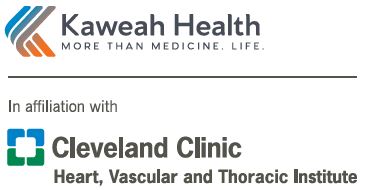Heart Health
 That’s why Kaweah Health has worked for more than 30 years to build
Central California’s best heart care program. On our journey to
world-class care, we’ve become one of America’s top 50 hospitals
for cardiac surgery and are proud to be in affilitation with Cleveland
Clinic’s Heart, Vascular & Thoracic institute, nationally ranked
for heart care.
That’s why Kaweah Health has worked for more than 30 years to build
Central California’s best heart care program. On our journey to
world-class care, we’ve become one of America’s top 50 hospitals
for cardiac surgery and are proud to be in affilitation with Cleveland
Clinic’s Heart, Vascular & Thoracic institute, nationally ranked
for heart care.
You can trust your heart health with us. So when it’s time to show your heart some love, start with a visit to your doctor.
The Heart's Role
The heart's main job is to pump the right amount of blood to all parts of the body. The heart is a muscle which contracts and relaxes as the blood cycles and recycles throughout the body.
The heart has four chambers. The upper chambers, atria, are divided into left and right. The right atrium collects blood returning from the body to the heart. The right atrium empties into the right ventricle, one of the lower chambers of the heart. A valve in between the atria and the ventricles helps move the blood through the heart and prevents blood flow in the wrong direction. The right ventricle pumps blood to the lungs to pick up a supply of oxygen. The oxygen rich blood is then pumped to left atrium, down through another valve and into the left ventricle. The left ventricle then pumps the blood through the aorta, a large blood vessel, that carries the oxygenated blood to the entire body, including the blood supply to the heart. The heart muscle needs its own supply of blood and oxygen in order to keep pumping. The coronary arteries, which lie on the surface of the heart, are essential in providing the nourishment and oxygen for the heart.
Heart Disease: Treatment & Diagnosis
It is important to have your heart status checked regularly. Initially,
this is part of your annual physical examination with your physician.
During your visit, you should tell the physician about any family members
who had or have heart disease.
Your physician will determine which tests are necessary for you to have to determine the present status of your heart. The most common tests check the function of your heart and the flow of blood in your body.
For example, you may be asked to have blood drawn and have an electrocardiogram (EKG) done. Other tests may be ordered by your doctor.
Medical Treatment
Your physician may determine that your heart disease can be treated with a combination of diet, exercise, and possibly medication.
Your diet will be changed so that you can lower your cholesterol, improve your blood pressure, and lose weight. Eating less fat and salt, and eating more fiber is essential. Your doctor may suggest that you see a dietician to assist you with meal planning.
Your exercise routine can be as simple as walking regularly, for example 30 minutes daily. You should build up slowly and begin exercising at least 3 times per week. Your final goal should be exercising four to five times per week for 20-40 minutes.
Should your physician prescribe medication, be sure to follow the directions. Ask your physician about any possible effects.
Interventional Treatment
Procedures can be used to treat chest pain or angina, and coronary artery disease. These include balloon angioplasty, atherectomy (rotoblation), and stent placement.
Know the Risk Factors
Several of the most important risk factors for heart disease are within your control.
- Cigarette Smoking. Nicotine causes blood vessels to narrow, which can greatly increase the chance of having a heart attack.
- Diet. A diet high in fat and cholesterol can add pounds and contribute to atherosclerosis. Increase fiber (fruits, vegetables, grains) and reduce fats to improve your heart health.
- High Blood Pressure. Hypertension can lead to blood vessel damage because the heart has to work harder to pump blood through narrowed or hardened vessels affected by atherosclerosis. This damage can lead to the formation of blood clots inside the blood vessels, which can cause heart attacks.
- Limited Physical Activity. Regular exercise will keep you young at heart. Any kind of physical activity is beneficial.
- Stress. Relieve stress through exercise, soothing music, relaxation techniques or a warm bath. Stress is a part of life and learning to control it could prolong your life.
Prevent Heart Disease
The best treatment for heart disease is prevention. There are identified risk factors, which if avoided can prevent heart disease. In other words you need to change unhealthy habits. Making changes to reduce risks can help your heart improve function. In some cases, such changes can even improve the health of your heart.
Lifestyle changes are focused on decreasing or eliminating risk factors.
- If you smoke, stop.
- If you have high blood pressure, eat heart healthy foods and exercise
- If you have high cholesterol, eat heart healthy food and exercise
- If you do not exercise, start
- If you are overweight, lose it, eat healthy and exercise
- If you are under stress, explore ways to decrease stress and exercise
- If you have diabetes, follow the treatment plan prescribed for you
